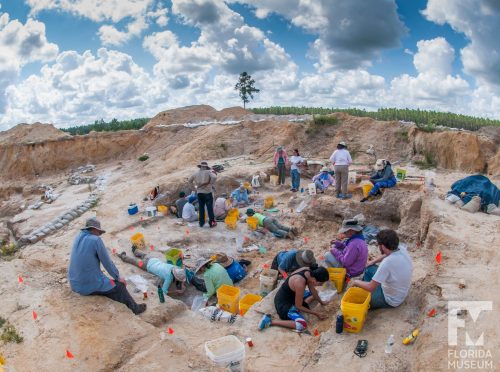GAINESVILLE, Fla. — K-12 science teachers from across Florida will spend four days this summer in a University of Florida laboratory as part of a professional development workshop hosted by the UF Thompson Earth Systems Institute titled “Florida’s Connection to the Biosphere.”

July 7-12, 34 teachers representing 10 counties who were selected from a pool of more than 70 applicants, will assist scientists with ongoing research projects while developing lesson plans related to the biosphere based on what they’ve learned.
It’s a win-win, says TESI director Bruce MacFadden.
“Teachers will not only be able to actually do the science and build connections with the scientists, they will be able to develop practical and relatable lesson plans that fit into their curriculum and meet state learning standards,” MacFadden said.
Ten UF laboratories from the Florida Museum of Natural History, the Institute of Food and Agricultural Sciences and the College of Liberal Arts and Sciences have agreed to host a small group of teachers for the week. The scientists’ research interests range from climate change and forests to the evolutionary history of mammals, each of which fit into the broad scope of the biosphere, or life on Earth.
In addition to hosting teachers for the six-day workshop, which includes two travel days, the scientists have agreed to make at least one in-person or virtual visit to the teachers’ classrooms this fall.
“During the classroom visit, students will be introduced to biosphere research as well as science role models and careers,” MacFadden said.
Michael Ziegler, former educator and graduate assistant for TESI, said this professional development workshop is different from others he’s helped organize.
“We really want to bridge the gap between University of Florida research and K-12 classrooms through this and future collaborations,” Ziegler said. “These experiences will help teachers shape lesson plans rooted in current scientific practices.”
The workshop is funded by the “Scientist in Every Florida School” project, a new initiative led by TESI to connect scientists with every K-12 school in the state through virtual classroom visits, web-based learning and scientist-teacher networking opportunities. The project was one of eight selected for UF’s “moonshot” initiative, a $17-million effort to solve some of society’s most urgent problems.
“Our goal for the “Scientist in Every Florida School” project is to better train teachers to deliver current science content, while improving students’ knowledge about STEM careers,” MacFadden said. “About 2.6 million Florida schoolchildren could benefit from the world-class science and research at UF. This workshop is a step toward achieving this goal.”
For more information about the “Scientist in Every Florida School Project,” visit: https://www.floridamuseum.ufl.edu/earth-systems/scientist-in-every-florida-school/.
-30-
Writer: Rebecca Burton, rlburton@floridamuseum.ufl.edu, 352-273-1939
Source: Bruce MacFadden, bmacfadd@ufl.edu, 352-273-1937